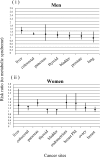Current perspectives between metabolic syndrome and cancer
- PMID: 27029038
- PMCID: PMC5122443
- DOI: 10.18632/oncotarget.8341
Current perspectives between metabolic syndrome and cancer
Abstract
Metabolic syndrome is a cluster of risk factors that lead to cardiovascular morbidity and mortality. Recent studies linked metabolic syndrome and several types of cancer. Although metabolic syndrome may not necessarily cause cancer, it is linked to poorer cancer outcomes including increased risk of recurrence and overall mortality. This review tends to discuss the major biological and physiological alterations involved in the increase of incidence and mortality of cancer patients affected by metabolic syndrome. We focus on metabolic syndrome-associated visceral adiposity, hyperinsulinemia, hyperglycemia, insulin-like growth factor (IGF-I) pathway as well as estrogen signaling and inflammation. Several of these factors are also involved in carcinogenesis and cancer progression. A better understanding of the link between metabolic syndrome and cancer may provide new insight about oncogenesis. Moreover, prevention of metabolic syndrome - related alterations may be an important aspect in the management of cancer patients during simultaneous palliative care.
Keywords: cancer risk; hyperglycemia; inflammation; metabolic syndrome; visceral adiposity.
Conflict of interest statement
There is no conflict of interest.
Figures



References
-
- Athyros VG, Ganotakis ES, Tziomalos K, Papageorgiou AA, Anagnostis P, Griva T, Kargiotis K, Mitsiou E K, Karagiannis A, Mikhailidis DP. Comparison of four definitions of the metabolic syndrome in a Greek (Mediterranean) population. Curr Med Res Opin. 2010;26:713–9. - PubMed
-
- Alberti KG, Eckel RH, Grundy SM, Zimmet PZ, Cleeman JI, Donato KA, Fruchart JC, James WP, Loria CM, Smith SC., Jr Harmonizing the metabolic syndrome: a joint interim statement of the International Diabetes Federation Task Force on Epidemiology and Prevention; National Heart, Lung, and Blood Institute; American Heart Association; World Heart Federation; International Atherosclerosis Society; and International Association for the Study of Obesity. Circulation. 2009;120:1640–5. - PubMed
-
- Ford ES, Giles WH, Dietz WH. Prevalence of the metabolic syndrome among US adults: findings from the third National Health and Nutrition Examination Survey. JAMA. 2002;287:356–359. - PubMed
-
- Cameron AJ, Shaw JE, Zimmet PZ. The metabolic syndrome: prevalence in worldwide populations. Endocrinol Metab Clin North Am. 2006;33:351–375. - PubMed
Publication types
MeSH terms
Substances
LinkOut - more resources
Full Text Sources
Other Literature Sources
Medical

